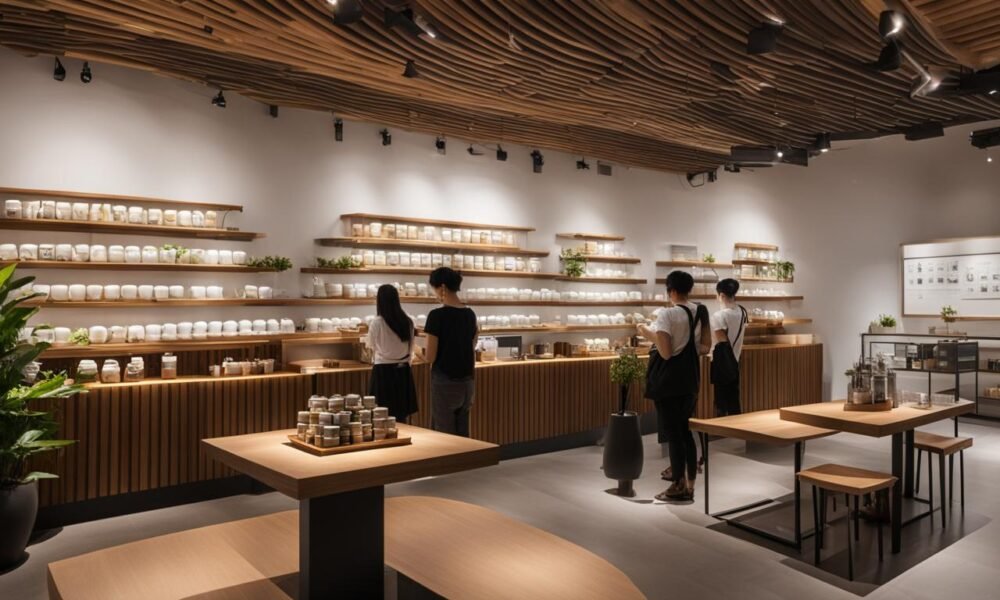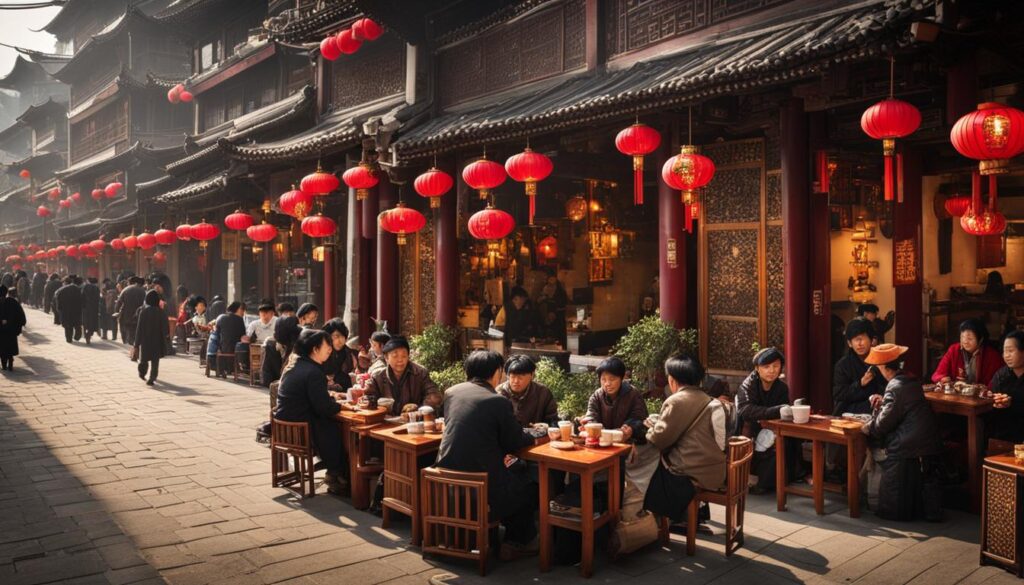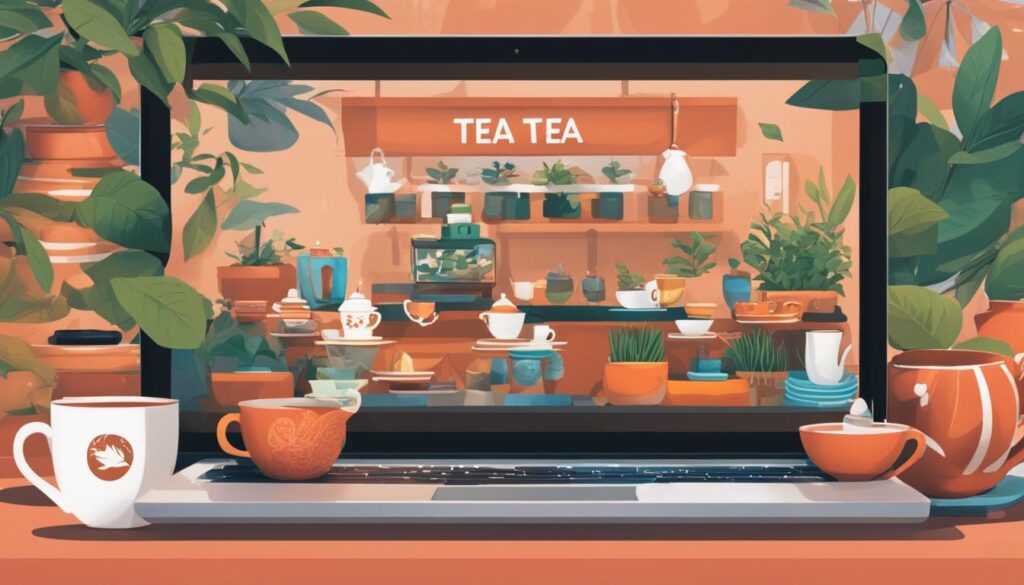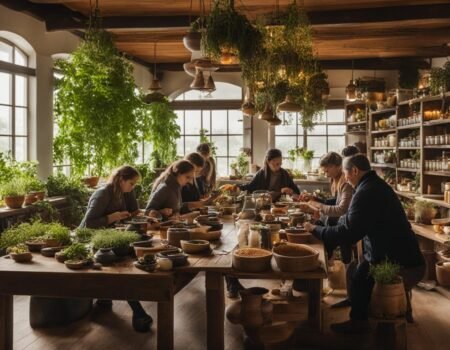
Social Media and Its Impact on Modern Tea Culture and Cafés
Social media’s impact on the tea culture and café industry has been profound. In this article, we will explore how social media has reshaped the traditional tea-drinking culture and influenced the way tea cafés operate.
The rise of coffee culture in China, driven by the influence of Western culture and the popularity of coffee shops, has had a significant impact on the traditional tea-drinking culture. Social media platforms like WeChat and Weibo have played a crucial role in promoting coffee as a trendy and sophisticated drink among the younger generation. As a result, new coffee shops and cafés offering modern ambiance with free Wi-Fi and charging points have emerged.
Key Takeaways:
- Social media has reshaped the traditional tea-drinking culture.
- The rise of coffee culture in China has influenced the popularity of coffee among the younger generation.
- Social media platforms play a crucial role in promoting coffee as a trendy drink.
- New coffee shops and cafés offer modern ambiance with free Wi-Fi and charging points.
- Social media has played a crucial role in promoting coffee as a trendy and sophisticated drink.
The Rise of Coffee Culture in China and its Impact on Tea Culture
China, traditionally a country known for its tea culture, has witnessed the rise of coffee culture in recent years. The influence of western culture and the popularity of western brands have contributed to the growing interest in coffee among the younger generation in China. Social media platforms like WeChat and Weibo, where influencers and celebrities share their coffee experiences, have played a significant role in the popularity of coffee.
As coffee culture continues to gain momentum, it has started to impact the traditional tea-drinking culture in China. Tea, which has been an integral part of Chinese culture for centuries, is now facing competition from coffee as a trendy and fashionable beverage. Coffee shops and cafés have become popular gathering places for socializing and spending time with friends, especially among the younger generation.
“Coffee has become more than just a beverage; it has become a symbol of modernity and sophistication. Social media has played a crucial role in promoting coffee as a lifestyle choice among the younger generation in China.”
The changing preference for coffee over tea has led to the emergence of new coffee shops and cafés across China. These establishments offer a modern and comfortable ambiance with free Wi-Fi and other amenities to attract customers. With the help of social media influencers and celebrities, coffee brands have successfully positioned coffee as a trendy and aspirational drink.
| Changing Aspects | Impact on Tea Culture |
|---|---|
| Influence of Western Culture | Increased interest in coffee among the younger generation |
| Popularity of Western Brands | Competition for traditional tea-drinking culture |
| Role of Social Media Platforms | Promotion of coffee as a trendy and sophisticated drink |
The rise of coffee culture and the impact of social media on tea culture are transforming the beverage landscape in China. While tea remains an essential part of Chinese culture, coffee consumption is on the rise, especially among urban, middle-class consumers. As the coffee industry continues to grow, it is important to understand the changing dynamics and adapt to the evolving preferences of consumers.
The Changing Demographics of Tea and Coffee Consumers in China
The consumption patterns of tea and coffee in China have experienced a significant shift in recent years, reflecting changing consumer preferences. While tea remains deeply rooted in Chinese culture, there has been a notable rise in the popularity of coffee, particularly among urban, middle-class consumers. This changing demographic is reshaping the beverage landscape and presenting new opportunities for both local and international coffee brands.

According to market research, coffee industry growth in China has been exponential, outpacing the traditional tea market. This can be attributed to the influence of social media, exposure to western culture, and a desire for novel experiences among the younger generation. As they seek to emulate the cafe culture portrayed on social media, coffee shops have become popular destinations for socializing and spending time with friends.
It is worth noting, however, that tea still holds a significant place in Chinese culture and continues to be consumed by a large portion of the population. Many tea enthusiasts still appreciate the traditional rituals and health benefits associated with tea consumption. As a result, tea cafes have also adapted to changing consumer preferences by offering more modern and comfortable environments for tea enthusiasts.
The Rise of Coffee Culture
One of the driving forces behind the rise of coffee culture in China is the influence of social media platforms such as WeChat and Weibo. Influencers and celebrities sharing their coffee experiences have created a sense of glamour and sophistication around the beverage, making it an aspirational choice for many young consumers. These platforms have also provided a space for coffee enthusiasts to connect and share their passion for the beverage, further fueling its popularity.
“Coffee has become more than just a drink; it is a lifestyle choice and a way of showcasing one’s social status,” says Jane Li, a social media influencer with a focus on coffee culture in China.
As the demographics of tea and coffee consumers in China continue to evolve, it is clear that social media will play a crucial role in shaping the future of these industries. Coffee brands will need to leverage digital platforms to engage with their target audience and create unique experiences that resonate with their consumers. Similarly, tea cafes will need to adapt and find ways to connect with younger consumers who are increasingly turning to coffee. The interplay between social media and beverage culture in China is an exciting space to watch as it continues to evolve and transform.
The Impact of Coffee Culture on Tea Shop Culture in China
The rise of coffee culture in China has had a significant impact on the traditional tea shop culture, leading to the emergence of new tea cafés that cater to the changing preferences of consumers. While tea remains an integral part of Chinese culture, the younger generation is increasingly embracing coffee as a new way of socializing and spending time with friends. This shift in consumer preferences has prompted tea cafés to adapt and create modern and comfortable spaces that appeal to coffee enthusiasts.
Social media platforms have played a crucial role in engaging tea followers online and promoting the tea culture. Tea cafés leverage social media to showcase their offerings, connect with their target audience, and create a sense of community. By sharing visually appealing and engaging content, tea cafés can build brand awareness and attract a larger customer base. They also use social media platforms to announce new products, promotions, and events, keeping their followers informed and engaged.
In response to the rise of coffee culture, tea cafés have introduced new concepts to appeal to a broader customer base. They provide free Wi-Fi, comfortable seating, and a relaxing ambiance, creating spaces where people can work, study, or socialize. Some tea cafés even combine elements of both tea and coffee culture, offering a variety of beverages to cater to different taste preferences. By diversifying their offerings and embracing the changing trends, tea cafés can stay relevant and attract a larger audience.
The Role of Social Media in Engaging Tea Followers
Social media has become a powerful tool for tea cafés to engage with their followers and build brand loyalty. They can directly interact with customers through comments, messages, and social media groups, allowing for real-time communication and feedback. This direct engagement helps tea cafés understand their customers’ preferences and tailor their offerings accordingly. Additionally, social media allows tea cafés to collaborate with influencers and micro-influencers to promote their brand and reach a wider audience.
The Role of Social Media in Tea Culture Content Creation
Social media platforms have revolutionized the way tea culture content is created and shared. Tea cafés and brands have tapped into the power of social media to promote their products and engage with their followers. Through strategic social media campaigns, tea cafés can reach a wider audience and generate buzz around their offerings. Let’s take a closer look at how social media has become an essential tool for tea culture content creation.
The Rise of Tea Culture Hashtags and Trends
Social media has given rise to a vibrant tea community where enthusiasts can connect and share their love for tea. Hashtags and trends related to tea culture have become popular on platforms like Instagram and Twitter, allowing users to discover new teas, recipes, and experiences. Tea cafés leverage these hashtags and trends to enhance their online visibility and attract tea lovers to their establishments.
Tea culture hashtags and trends create a sense of belonging and community among tea enthusiasts, as they can easily connect and engage with like-minded individuals. These hashtags also serve as a source of inspiration for tea cafés, helping them curate content that resonates with their target audience.
Social Media Campaigns for Tea Cafés
Social media campaigns are a powerful tool for tea cafés to showcase their unique offerings and engage with their followers. These campaigns can take various forms, including contests, giveaways, and interactive content. By leveraging the reach and engagement of social media platforms, tea cafés can build brand awareness, drive foot traffic, and foster a loyal customer base.
Measuring Success Through Social Media Analytics
Social media analytics play a crucial role in measuring the success of tea culture content creation efforts. Tea cafés can track metrics such as reach, engagement, and conversion to gain insights into the effectiveness of their social media campaigns. This data-driven approach allows them to make informed decisions and refine their content strategies to maximize their impact.
| Metrics | Description |
|---|---|
| Reach | The number of unique users who have seen a tea café’s social media posts. |
| Engagement | The level of interaction users have with a tea café’s social media content, including likes, comments, and shares. |
| Conversion | The percentage of users who take a desired action, such as making a purchase or visiting a tea café’s physical location. |
By leveraging the power of social media, tea cafés can create compelling content, engage with their followers, and drive tea culture forward. The future of tea culture content creation is undoubtedly intertwined with the ever-evolving landscape of social media platforms. As trends continue to emerge and technology advances, tea cafés will continue to find innovative ways to share their passion for tea with a global audience.
The Influence of Social Media on Tea Culture Engagement
Online tea culture engagement has been revolutionized by the influence of social media platforms. With the advent of platforms like Instagram and YouTube, tea enthusiasts and tea cafés alike have found new ways to connect with and engage their followers. Through visually appealing posts and informative videos, they can share their love for tea, showcase their products and services, and build a community around their brand.
Engaging tea followers online is an essential aspect of social media management for tea cafés. By creating regular and engaging content, tea cafés can attract a wider audience and keep their followers interested and invested. This could include sharing brewing tips, introducing new tea flavors, or organizing virtual tea tasting events. The possibilities are endless, and the key is to consistently provide value and capture the interest of tea enthusiasts.
“Social media has opened up new avenues for us to interact with our customers and build a strong tea community. We love sharing our passion for tea through captivating visuals and educational content. It’s incredible to see the level of engagement and enthusiasm from our followers, and it motivates us to continue creating meaningful tea experiences online.”
Creating a Strong Online Presence
To effectively engage with tea followers on social media, tea cafés must have a well-managed online presence. This involves developing a content strategy that aligns with the brand’s values and target audience. It’s important to create a consistent brand identity and use a cohesive visual aesthetic that reflects the tea café’s ambiance and offerings.
Social media management tools can be utilized to schedule posts, track engagement metrics, and respond to comments and messages promptly. By leveraging these tools, tea cafés can maintain an active and responsive online presence, ensuring that their followers feel heard and valued.
| Benefits of Social Media Engagement for Tea Cafés | Key Strategies for Engaging Tea Followers | Examples of Engaging Content |
|---|---|---|
|
|
|

By embracing the power of social media, tea cafés can elevate their online presence and foster meaningful connections with their audience. The engagement and enthusiasm of tea followers on these platforms create a vibrant and thriving tea community, driving the growth and evolution of tea culture in the digital age.
The Future of Tea Culture and Social Media
Social media has had a profound impact on tea culture, and its influence is expected to continue shaping the industry in the future. As we embrace technological advancements and witness the evolution of social media platforms, we can anticipate emerging trends that will further connect tea enthusiasts, brands, and communities worldwide.
One of the key influences of social media on the tea industry is the ability to tell digital stories. Through visually engaging content, tea cafés and brands can captivate their audience and create immersive experiences. From beautifully crafted videos to stunning photos, social media provides a platform for tea culture content creation that resonates with a wide range of individuals.
Social media has become a powerful storytelling tool for the tea industry, allowing brands to engage with their audience on a deeper level and showcase the rich history, traditions, and flavors of tea.
Another significant aspect of the future of tea culture and social media is the rise of online tea communities. Social media platforms have facilitated the connection and communication between tea enthusiasts around the world, creating a global network of tea lovers. This online community allows for the exchange of knowledge, experiences, and recommendations, fostering a sense of belonging and camaraderie among tea enthusiasts.
As social media continues to evolve, it will play a crucial role in the growth and development of tea culture. From innovative marketing strategies to immersive experiences, tea cafés and brands will adapt to emerging trends and leverage technology to create unique customer experiences. The future of tea culture looks promising, as social media acts as a bridge, connecting tea enthusiasts, brands, and communities on a global scale.
| Trend | Description |
|---|---|
| Tea Tourism | Travel experiences centered around tea, such as tea plantations, tea ceremonies, and tea tastings. |
| Functional Teas | Teas that offer health benefits, such as detoxification, relaxation, and immune support. |
| Tea Mixology | The art of creating tea-based cocktails and mocktails, combining unique flavors and ingredients. |
| Sustainability | A focus on eco-friendly practices, such as organic farming, fair trade, and biodegradable packaging. |
Tea Tourism
The trend of tea tourism is expected to grow as more individuals seek unique travel experiences. Tea enthusiasts can explore tea plantations, participate in traditional tea ceremonies, and indulge in high-quality tea tastings. This trend not only promotes cultural exchange but also supports local tea communities and economies.
Functional Teas
Functional teas, also known as wellness teas, are gaining popularity as consumers prioritize health and well-being. These teas offer various health benefits, such as detoxification, stress relief, and immune support. From herbal blends to botanical infusions, functional teas provide a flavorful way to incorporate wellness into daily routines.
Tea Mixology
The art of tea mixology combines the flavors and aromas of tea with creative cocktail and mocktail recipes. Tea-based beverages infused with unique ingredients and innovative techniques offer a refreshing alternative to traditional alcoholic drinks. Tea mixology provides an opportunity for tea cafés and mixologists to showcase their creativity and craft unique flavor combinations.
Sustainability
The sustainability trend in the tea industry focuses on environmentally friendly practices and initiatives. From organic farming methods to fair trade certifications, the industry is making efforts to reduce its ecological footprint. Additionally, biodegradable packaging and eco-conscious manufacturing processes are becoming more prevalent to minimize waste and promote sustainability.
Conclusion
The impact of social media on tea culture and tea cafés is undeniable. Social media has reshaped the traditional tea-drinking culture, influenced by the rise of coffee culture and changing consumer preferences. We have witnessed the transformation of tea cafés embracing social media as a powerful marketing tool, creating engaging content, and connecting with their followers.
As the tea industry continues to evolve, social media will play a crucial role in shaping the future of tea culture. It serves as a platform that brings together tea enthusiasts, brands, and communities worldwide. Whether it’s through creative campaigns, immersive experiences, or online engagement, social media enables the tea industry to reach a wider audience and foster a sense of community among tea lovers.
With the ever-advancing technology and the evolution of social media platforms, the future of tea culture looks promising. Digital storytelling and interactive experiences will become even more prevalent, allowing tea brands to connect with their audience on a deeper level. Tea cafés will adapt to emerging social media trends and leverage technology to create unique customer experiences that go beyond just the beverage itself.
In conclusion, social media has revolutionized the way we experience tea culture. Its impact on the tea industry is profound, and it will continue to shape the future of tea culture. As tea enthusiasts, brands, and communities come together online, social media acts as a bridge, fostering connections and sharing the love for tea worldwide.
FAQ
How has social media influenced tea culture and tea cafés?
Social media has significantly impacted tea culture and the way tea cafés operate. It has reshaped the traditional tea-drinking culture, influenced by the rise of coffee culture and changing consumer preferences. Tea cafés leverage social media platforms to promote their products, engage with their followers, and create unique experiences.
What is the impact of coffee culture on tea culture in China?
The rise of coffee culture in China has impacted the traditional tea-drinking culture. The younger generation, influenced by western culture and exposure to coffee abroad, has developed a taste for coffee. This shift in consumer preferences has led to the emergence of new tea cafés that offer a modern ambiance. While tea remains an integral part of Chinese culture, coffee consumption has become popular among urban, middle-class consumers.
How have the demographics of tea and coffee consumers in China changed?
The younger generation in China, influenced by western culture and exposure to coffee abroad, has driven the growth of the coffee industry. Coffee has become popular among urban, middle-class consumers, leading to the emergence of local coffee brands competing with international brands. While tea remains an essential part of Chinese culture, the growing interest in coffee has impacted the traditional tea-drinking culture.
How has coffee culture impacted tea shop culture in China?
The rise of coffee culture in China has led to the emergence of new tea cafés that offer a modern and comfortable ambiance. While tea remains an integral part of Chinese culture, the younger generation is increasingly embracing coffee as a new way of socializing and spending time with friends. Social media platforms have played a crucial role in engaging tea followers online and promoting the tea culture.
How does social media contribute to tea culture content creation?
Social media has become a powerful platform for tea culture content creation. Tea cafés and brands leverage social media platforms to promote their products, engage with their followers, and create unique experiences. Social media campaigns, with creative hashtags and trends, help tea cafés reach a wider audience and generate buzz around their offerings.
What is the role of social media in tea culture engagement?
Social media plays a crucial role in engaging tea followers and building a community around tea cafés. Tea enthusiasts and brands can connect with each other through social media platforms, sharing their experiences, knowledge, and passion for tea. Social media management is essential in maintaining a positive brand image, responding to comments and messages, and ensuring regular and engaging content.
How will social media shape the future of tea culture?
The future of tea culture is closely intertwined with social media. As technology advances and social media platforms evolve, the way people engage with tea culture will continue to change. Digital storytelling and immersive experiences will play a more significant role in connecting tea enthusiasts and brands. The online tea community will continue to grow, creating a global network of tea lovers, influencers, and brands.
What is the conclusion regarding the impact of social media on tea culture and tea cafés?
The impact of social media on tea culture and tea cafés is undeniable. It has reshaped the traditional tea-drinking culture, influenced by the rise of coffee culture and changing consumer preferences. Tea cafés have embraced social media as a powerful marketing tool, creating engaging content, and connecting with their followers. As the tea industry continues to evolve, social media will play a crucial role in shaping the future of tea culture, bringing together tea enthusiasts, brands, and communities worldwide.






